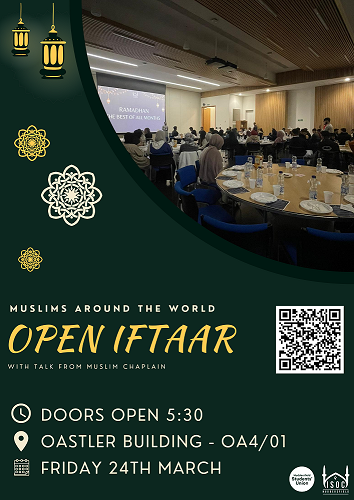Ramadan
Ramadan is the ninth month of the Islamic calendar where Muslims all over the world try to attain nearness and closeness to their God through devotion and commitment to fasting and prayers. This year Ramadan will fall on the evening of Wednesday 22nd March, depending on the sighting of the moon and will last for 30 days, expecting to end on Friday 21st April, according to the Islamic Lunar calendar. It is believed that during this time was when the first verses of the Qur’an (holy book) were revealed to Prophet Muhammad.
Fasting means eating for a period of time before dawn (Suhoor) to prepare for a day without consuming food and drink until the time of sunset which signals for the opening of the fast (Iftar). Fasting is an important act of worship; not only is it the fifth pillar of Islam (the groundwork of the whole religion), but it's an opportunity for building a closer relationship with Allah.
However, for many Muslims, Ramadan is much more than abstaining from eating or drinking during daylight hours. When observing Ramadan, people are encouraged to take this time to engage in extra prayers, more charity, volunteering, provide khidma (service) and generally establish good habits and work to eliminate any bad ones. It's a time for community, self-reflection, gratitude, spirituality, self-discipline, humility and empathy.
At the end of Ramadan, Muslim people celebrate Eid ul Fitr which roughly translates to ‘the fast-breaking festival’. This is where people take a day to celebrate the end of the month of Ramadan with friends and family. It’s a time of celebration, joy and togetherness. This year, this is looking to begin at sundown on Friday 21st April and runs until the evening of Saturday 22nd April. On this day people say ‘Eid Mubarak’ which means ‘Have a blessed Eid’!
Guidance for managers and members of staff
- Be aware and open to discussing Ramadan and what support or adjustments Muslim staff members would like.
- Observance may vary between individuals due to health, travel and other personal circumstances.
- Members of staff may request leave over this period, for example, to work half-days and/or shorter working weeks to enable them to observe Ramadan. Other Muslim colleagues may request more flexible working arrangements. Leave requests are also likely to be made to enable staff to celebrate Eid with their families at the end of Ramadan. These requests should be managed in line with all existing University HR policies.
- Managers may wish to consider their meeting times over this period which enables the contribution of most members of staff. Earlier meetings may be preferred but ask staff members how you can accommodate them.
- Check in on staff and student wellbeing.
- Try and avoid social activities or working lunches during Ramadan.
- All members of staff are advised to demonstrate empathy, sensitivity and understanding to balance supporting our staff to manage their Ramadan commitments, alongside ensuring we meet all our business needs.
I'm a colleague who works with staff that are observing Ramadan, how can I be a great ally?
- Exchange Ramadan greetings by saying “Ramadan Kareem,” which translates into “Have a generous Ramadan,” or “Ramadan Mubarak,” which roughly translates into “Happy Ramadan.”
- Be mindful that staff might be fasting for long hours over the next month. Be kind!
- Attend an event, like the open Iftaar detailed below, to learn more about Ramadan.

Events
Open Iftaar: Muslims around the world
Oastler Building, Room OA4/01
Friday 24th March 5:30pm
Open to all students and staff members.
The BAME Students Network and Islamic Society welcomes you to our annual Iftaar!
Join us as we break our fast, enjoy other cultures and listen to a khutbah (speech) from our Muslim Chaplain, Imam Muhammad M Patel
Tickets are just £2 - book your space now as we have limited tickets left! Doors open at 5:30 and the event will begin at exactly 6PM - please arrive before 6PM as we must break our fast and begin Maghreb prayers promptly!
Food served: Asian Cuisine
There will be an allocated time and space for Maghreb prayers - Isha/Taraweeh prayers will take place in the Jo Cox More in Common Centre.
Ramadan Kits
The Ramadan Kits are free for Muslim students observing Ramadan (staff are welcome to pick up the kits to share with students). Iftar is the meal we have when we break the fast at sunset. Iftar is a time for families, friends and neighbours to spend together, break fast and share food.
The Ramadan Kits contain informational content on Ramadan, prayers, dates, and a Ramadan Kareem greeting card for individuals to give to someone observing Ramadan. These kits will be handed out after Jumu’ah Prayers every Friday.
Tarawih – night prayers
Will be held at the ISHA prayer time every day in the Jo Cox More in Common Centre.
Iftar in the Jo Cox More in Common Centre
Students will attend every day to break their fast - the Chaplaincy is providing meals throughout different days of the month, dates and water will be provided every day.
Find out more about Chaplaincy at the Jo Cox More in Common Centre by visiting our webpages on Faith or contacting Muhammad Patel the Muslim Chaplain at the University of Huddersfield.
